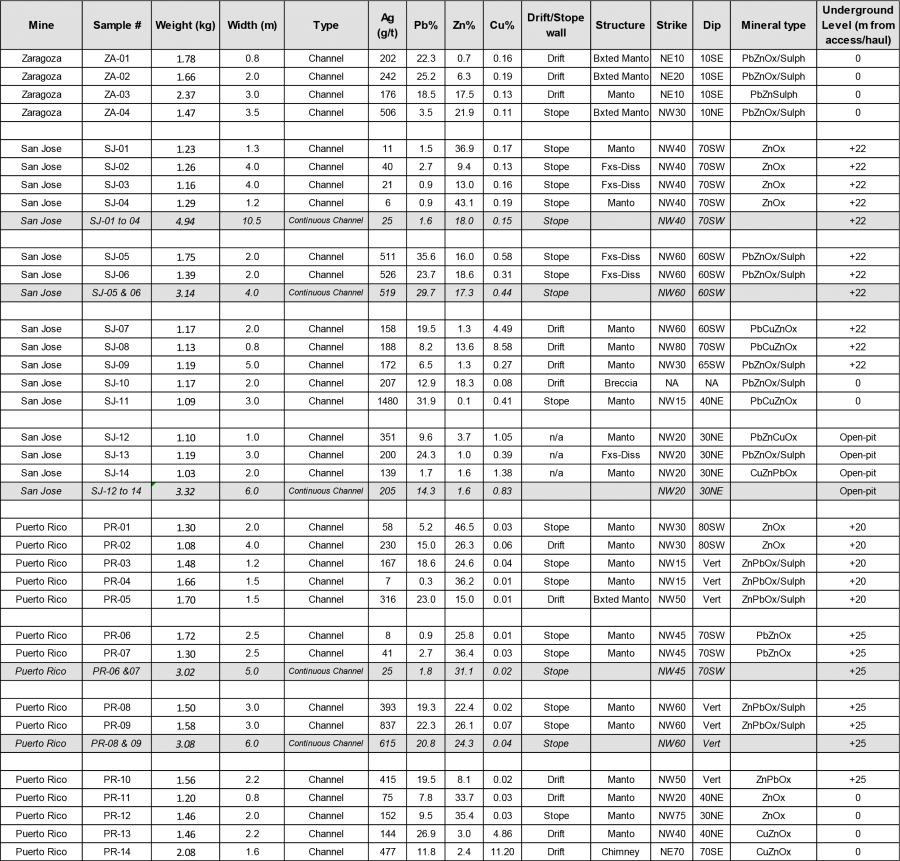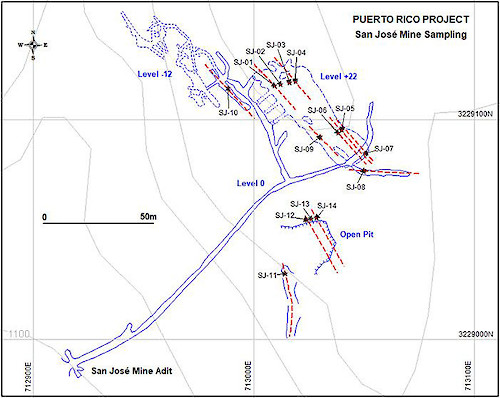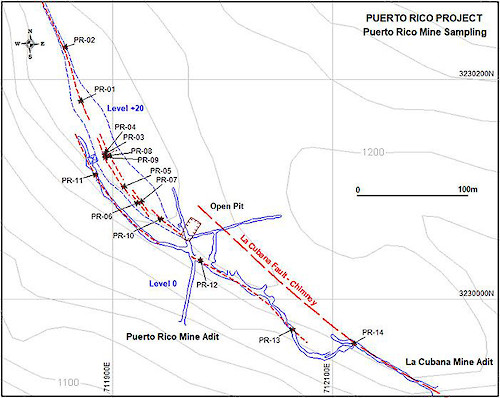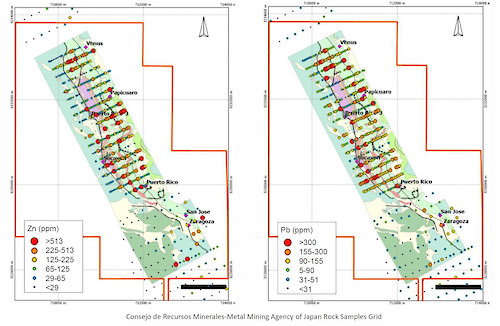Comunicado de Prensa
Discovery Metals Announces High-Grade Channel Sample Results From Puerto Rico Project
Including values of 1,480 g/t Ag, 46.5% Zn, 35.6% Pb and 11.2% Cu
November 7, 2017, Toronto, Ontario - Discovery Metals Corp. (TSX-V: DSV) ("Discovery" or the "Company") is pleased to announce that it has received assay results on an initial 32 channel samples from its Puerto Rico Project (“the Project”) in northern Coahuila State, Mexico. The Puerto Rico Project is a large, multi-target carbonate replacement mining district, with approximately one million tonnes of past production of direct-shipping, shallow, high-grade zinc ore. Discovery controls approximately 350 km2 of mineral rights covering a 6 km long trend of historic mines and alteration features, as well as prospective structural extensions.
Highlights:
The 32 channel samples released herein are from the southern half of the project, where three mines produced ores in the early part of the twentieth century: from north to south, the Puerto Rico, San Jose and Zaragoza Mines, with a distance of ~1.5 km between Puerto Rico and Zaragoza. Of the 32 channel samples, 13 samples are part of five “continuous channels” which comprise 2-4 side-by-side individual channel samples; the other 19 channel samples are individual channels taken from various locations at the mines; a vast majority of the samples were taken from the walls of historic drifts and stopes and three were taken from open-pit workings. The samples were all chip-cut perpendicular to the mineralization; the mineralization was mainly manto-type with some samples also from high-angle breccias, fracture zones and chimney features. Results of the five continuous channels include:
- Continuous channel “SJ-01 to 04”, from the San Jose Mine, had a weighted average grade of 18.0% zinc (Zn), 1.6% lead (Pb), 0.15% copper (Cu), and 25 grams per tonne (g/t) silver (Ag) over a total width of 10.5 meters (m). This represents a channel comprised of four continuous channel samples, with total weight of 4.94 kg, from the wall of a manto dipping at 70o SW, exposed in a stope at level +22 (i.e. 22 m above access / haulage).
- Continuous channel “SJ-05 & 06”, from the San Jose Mine, had a weighted average grade of 17.3% Zn, 29.7% Pb, 0.44% Cu, and 519 g/t Ag over a total width of 4 m. This represents a channel of two continuous channel samples, with total weight of 3.14 kg, from the wall of a manto dipping at 60o SW, exposed in a stope at level +22.
- Continuous channel “SJ-12 to 14”, from the San Jose Mine, had a weighted average grade of 1.6% Zn, 14.3% Pb, 0.83% Cu, and 205 g/t Ag over a total width of 6 m. This represents a channel of three continuous channel samples, with total weight of 3.32 kg, from the wall of a manto dipping at 30o NE, exposed at surface (open-pit cut).
- Continuous channel “PR-06 & 07”, from the Puerto Rico Mine, had a weighted average grade of 31.1% Zn, 1.8% Pb, and 25 g/t Ag over a total width of 5 m. This represents a channel of two continuous channel samples, with total weight of 3.02 kg, from the wall of a manto dipping at 70o SW, exposed in a stope at level +25.
- Continuous channel “PR-08 & 09”, from the Puerto Rico Mine, had a weighted average grade of 24.3% Zn, 20.8% Pb, and 615 g/t Ag over a total width of 6 m. This represents a channel of two continuous channel samples, with total weight of 3.08 kg, from the wall of a vertically-dipping manto, exposed in a stope at level +25.
Taj Singh, Discovery President and CEO, commented: “The results of our channel samples demonstrate the very high-grade polymetallic mineralization exposed on surface and in near-surface abandoned mine workings at our Puerto Rico Project. Puerto Rico has all the characteristics of a major carbonate-replacement mining district, with multiple past-producing mines that were left open to expansion, substantial evidence of very high-grade mineralization, and a mixture of polymetallic oxide and sulfide ore types within the deposit. With the grades that we are seeing here, the project continues to show high potential. Considering the extensive existing underground workings and a long production history, there is significant compilation work to be done in the coming months, in conjunction with surface exploration activities. We have commenced the drill-permitting process and are aiming to be in a position to start drilling in Q3 2018.”
Results & Discussion:
A summary set of results are shown in Table 1. Table 2 shows the complete data set and Figures 1 and 2 show corresponding locations of the samples on plan views.
Table 1 – Summary of Puerto Rico Project Q4-2017 Channel Samples
|
Mine |
Sample # |
Wt (kg) |
Width (m) |
Ag (g/t) |
Pb % |
Zn % |
Cu % |
Drift/Stope wall |
Dip |
UG Level (m) |
|
Zaragoza |
ZA-01 |
1.78 |
0.8 |
202 |
22.3 |
0.7 |
0.16 |
Drift |
10SE |
0 |
|
Zaragoza |
ZA-02 |
1.66 |
2.0 |
242 |
25.2 |
6.3 |
0.19 |
Drift |
10SE |
0 |
|
Zaragoza |
ZA-03 |
2.37 |
3.0 |
176 |
18.5 |
17.5 |
0.13 |
Drift |
10SE |
0 |
|
Zaragoza |
ZA-04 |
1.47 |
3.5 |
506 |
3.5 |
21.9 |
0.11 |
Stope |
10NE |
0 |
|
San Jose |
SJ-01 to 04 |
4.94 |
10.5 |
25 |
1.6 |
18.0 |
0.15 |
Stope |
70SW |
+22 |
|
San Jose |
SJ-05 & 06 |
3.14 |
4.0 |
519 |
29.7 |
17.3 |
0.44 |
Stope |
60SW |
+22 |
|
San Jose |
SJ-07 |
1.17 |
2.0 |
158 |
19.5 |
1.3 |
4.49 |
Drift |
60SW |
+22 |
|
San Jose |
SJ-08 |
1.13 |
0.8 |
188 |
8.2 |
13.6 |
8.58 |
Drift |
70SW |
+22 |
|
San Jose |
SJ-09 |
1.19 |
5.0 |
172 |
6.5 |
1.3 |
0.27 |
Drift |
65SW |
+22 |
|
San Jose |
SJ-10 |
1.17 |
2.0 |
207 |
12.9 |
18.3 |
0.08 |
Drift |
NA |
0 |
|
San Jose |
SJ-11 |
1.09 |
3.0 |
1480 |
31.9 |
0.1 |
0.41 |
Stope |
40NE |
0 |
|
San Jose |
SJ-12 to 14 |
3.32 |
6.0 |
205 |
14.3 |
1.6 |
0.83 |
n/a |
30NE |
Surface/ Pit |
|
Puerto Rico |
PR-01 |
1.30 |
2.0 |
58 |
5.2 |
46.5 |
0.03 |
Stope |
80SW |
+20 |
|
Puerto Rico |
PR-02 |
1.08 |
4.0 |
230 |
15.0 |
26.3 |
0.06 |
Drift |
80SW |
+20 |
|
Puerto Rico |
PR-03 |
1.48 |
1.2 |
167 |
18.6 |
24.6 |
0.04 |
Stope |
Vert |
+20 |
|
Puerto Rico |
PR-04 |
1.66 |
1.5 |
7 |
0.3 |
36.2 |
0.01 |
Stope |
Vert |
+20 |
|
Puerto Rico |
PR-05 |
1.70 |
1.5 |
316 |
23.0 |
15.0 |
0.01 |
Drift |
Vert |
+20 |
|
Puerto Rico |
PR-06 &07 |
3.02 |
5.0 |
25 |
1.8 |
31.1 |
0.02 |
Stope |
70SW |
+25 |
|
Puerto Rico |
PR-08 & 09 |
3.08 |
6.0 |
615 |
20.8 |
24.3 |
0.04 |
Stope |
Vert |
+25 |
|
Puerto Rico |
PR-10 |
1.56 |
2.2 |
415 |
19.5 |
8.1 |
0.02 |
Drift |
Vert |
0 |
|
Puerto Rico |
PR-11 |
1.20 |
0.8 |
75 |
7.8 |
33.7 |
0.03 |
Drift |
40NE |
0 |
|
Puerto Rico |
PR-12 |
1.46 |
2.0 |
152 |
9.5 |
35.4 |
0.03 |
Stope |
30NE |
0 |
|
Puerto Rico |
PR-13 |
1.46 |
2.2 |
144 |
26.9 |
3.0 |
4.86 |
Drift |
40NE |
0 |
|
Puerto Rico |
PR-14 |
2.08 |
1.6 |
477 |
11.8 |
2.4 |
11.2 |
Drift |
70SE |
0 |
The samples are part of a system of northwest-striking, primarily steeply-southwest dipping mantos that are open to expansion at depth and along strike. The mineralization is controlled by original limestone stratigraphy which has been deformed into tight northwest-striking folds. The manto-style mineralization tends to follow favorable beds in the limestone. The combination of both original sulfide mineralization and subsequent oxidation have resulted in varying mixtures of silver – lead – zinc – copper values. The widths and grades in this initial sampling provide encouragement to the Company that economically robust polymetallic grades potentially occur on the project, and that a substantial program of geology, geophysics, geochemistry, and drilling is merited.
Planned work program:
A detailed compilation program, based on historic production and exploration data, is underway. The Company plans to begin surface exploration work in Q1 2018, which will include extensive high-quality remote sensing to detect alteration patterns, geologic mapping, extensive rock-chip geochemistry using both hand-held XRF and laboratory-submitted samples, and ground geophysics. The Company plans to begin drilling, subject to receiving permits, in Q3 2018.
Puerto Rico Project background:
The Puerto Rico Project has a long and rich history, as described in the Company’s August 2017 NI-43-101 Technical Report, available on SEDAR. Mineralization at the Puerto Rico Mine was first discovered in 1883 as an outcropping lead-silver oxide chimney, and subsequently at the more southerly San Jose Mine. The project was leased to the Kansas City Smelting and Refining Company in 1896 and the Puerto Rico chimney was mined from 1896 to 1900. In 1906, ASARCO, a stock company, was formed to mine zinc oxides from the walls of the lead oxide stopes. An aerial tramway was constructed near the Puerto Rico mine to haul ores across the Rio Grande and into Texas. It was then transported to Marathon, Texas to be shipped by rail to St. Louis. Mining of the zinc oxides ended around 1918 due to the onset of the Mexican Revolution. Production is poorly documented from the 1920s to 1960s. Mining of direct-shipping zinc oxide ores took place from the 1970s to 1985. During this time, the majority of workings on haulage levels of the Puerto Rico and San Jose mines were excavated after mantos were recognized in historic haulage crosscuts. From 1975 to 1978, Mexico’s Consejo de Recursos Minerales (CRM), in partnership with the Metal Mining Agency of Japan, conducted surface geology and geochemical sampling. Core drilling was conducted at the Papicuano lead-silver occurrence in the north portion of the trend, but no drilling was performed at the Puerto Rico or San José mines. The CRM measured approximately 4,000 metres of underground workings in the district as a whole and suggested that on the order of one million tonnes of material has been mined since initial exploitation.
Qualified Person & QA/QC: This news release was reviewed and approved by Taj Singh, M.Eng, P.Eng, President and CEO of the Company, who is recognized as a Qualified Person (“QP”) under the guidelines of National Instrument 43-101. Discovery Metals has a QA/QC program in place, including assurances that samples are sealed on the project site, and transported to the laboratory in company vehicles or insured courier. The Company maintains a policy of regularly inserting registered control reference materials and blank samples to assure that laboratory results are reliable, and this policy was used for the samples in this press release. The channel samples presented in this press release were were taken with hammer and chisel across intervals. Samples were prepared at ALS labs in Hermosillo and Guadalajara, where they were dried, crushed, split and pulverized, then shipped to the ALS lab in Vancouver. At ALS Vancouver, samples were first assayed using the ME-ICP61a (Conventional ICP-AES) analytical package. For values of zinc greater than 10%, values of lead greater than 10%, and values of silver greater than 200 g/t, samples were re-assayed using the ME-OG62 (High-Grade Material ICP-AES) analytical package. For values of zinc greater than 30%, samples were re-assayed using the Zn-VOL50 (Potentiometric titration for Zn) analytical package. For values of lead greater than 20%, samples were re-assayed using the Pb-VOL70 (Volumetric Titration with EDTA for the Determination of Lead) analytical package.
About Discovery Metals
Discovery Metals is focused on discovering and advancing high grade polymetallic deposits in a recently assembled land package of approximately 300,000 hectares over a large and historic mining district in northern Coahuila State, Mexico. The portfolio of seven key properties, all with shallow high grade silver-zinc-lead mineralization, is situated in a world class Carbonate Replacement Deposit (CRD) belt that stretches from SE Arizona to central Mexico. The land holdings contain numerous historical direct-ship ore workings with over 4,000 m of underground development. No modern exploration or exploration drill testing has been carried out on the properties.
On Behalf of the Board of Directors of:
DISCOVERY METALS CORP.
For further information contact:
|
Taj Singh, P.Eng, CPA |
Susie Bell |
Neither TSX Venture Exchange nor its Regulation Services Provider (as that term is defined in policies of the TSX Venture Exchange) accepts responsibility for the adequacy or accuracy of this release.
Cautionary Note Regarding Forward-Looking Statements: This news release may include forward-looking statements that are subject to inherent risks and uncertainties. All statements within this news release, other than statements of historical fact, are to be considered forward looking. Although the Company believes the expectations expressed in such forward-looking statements are based on reasonable assumptions, such statements are not guarantees of future performance and actual results or developments may differ materially from those described in forward-looking statements. Factors that could cause actual results to differ materially from those described in forward-looking statements include fluctuations in market prices, including metal prices, continued availability of capital and financing, and general economic, market or business conditions. There can be no assurances that such statements will prove accurate and, therefore, readers are advised to rely on their own evaluation of such uncertainties. We do not assume any obligation to update any forward-looking statements except as required under applicable laws
Table 2 – Puerto Rico Project Q4-2017 Channel Sampling – Complete results
Notes:
Structure codes: Bxted = brecciated; Fxs-Diss = fractures-disseminated, a mineralization-type that is not massive but along irregular veinlets-fractures and disseminated in the rock-matrix
Figure 1 - Sample location map of the San José Mine workings showing channel samples reported in this Press Release.The mine workings that were accessible to sample expose multiple sub-parallel, steeply-dipping manto replacement deposits that at this level are oxidized.
Figure 2 - Sample location map of the Puerto Rico Mine workings showing channel samples reported in this Press Release. There are multiple horizons of manto-style replacement in the limestones at this mine.
Figure 3 - General Geologic map showing 1970s era rock-chip geochemistry along the main 6-kilometre northern portion of the Puerto Rico Project, from the Venus mine on the north to the Zaragoza Mine on the south. The Mexico government agency “Consejo de Recursos Minerals”, along with the “Metal Mining Agency of Japan completed an extensive program of geologic mapping and 814 geochemical samples from 1975 to 1978. This data has been captured by the Company to guide its future exploration.




